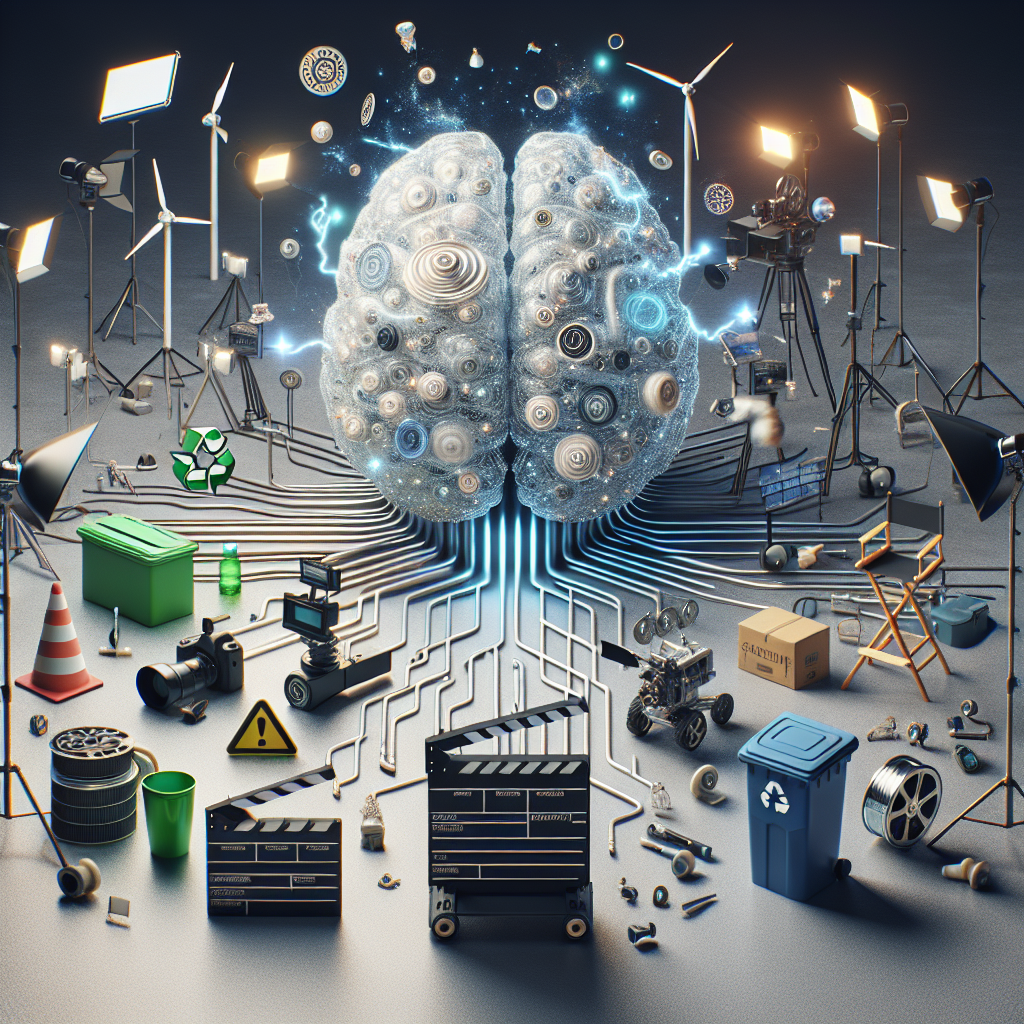AI (Artificial Intelligence) is revolutionizing various industries, and one of the areas where it is making a significant impact is in film production. From pre-production to post-production, AI technology is helping filmmakers improve sustainability practices and reduce the environmental impact of their projects. In this article, we will explore how AI is being used to enhance sustainability in film production and the benefits it offers to both the industry and the environment.
### AI in Pre-Production
In the pre-production phase of filmmaking, AI is being used to streamline the planning process and make it more efficient. One way AI is being utilized is in script analysis. By analyzing scripts using AI algorithms, filmmakers can identify potential issues that may impact the sustainability of the project, such as excessive use of resources or locations that are not environmentally friendly. This allows filmmakers to make changes to the script before production begins, saving time and resources in the long run.
AI is also being used in location scouting to help filmmakers find sustainable filming locations. By analyzing data such as weather patterns, traffic conditions, and environmental impact, AI can recommend locations that are eco-friendly and will minimize the carbon footprint of the production. This not only benefits the environment but also saves filmmakers time and money by finding the best locations for their projects.
### AI in Production
During the production phase, AI is being used to optimize resources and reduce waste. One way AI is being utilized is in camera technology. AI-powered cameras can automatically adjust settings such as exposure, focus, and white balance to ensure optimal image quality while minimizing energy consumption. This reduces the need for manual adjustments by camera operators, saving time and resources on set.
AI is also being used in lighting and sound design to create more sustainable production processes. By analyzing data on lighting conditions and sound levels, AI can recommend the most energy-efficient lighting and sound equipment to use on set. This not only reduces the carbon footprint of the production but also saves filmmakers money on energy costs.
### AI in Post-Production
In the post-production phase, AI is being used to automate tasks such as editing, color correction, and visual effects. By using AI algorithms to analyze footage and make editing decisions, filmmakers can save time and resources in the editing process. This not only speeds up the post-production workflow but also reduces the energy consumption of editing equipment, making the process more sustainable.
AI is also being used in distribution and marketing to reach a wider audience while minimizing the environmental impact. By analyzing data on audience preferences and behavior, AI can recommend the most sustainable distribution channels and marketing strategies to use for a film. This not only reduces the carbon footprint of the distribution process but also maximizes the film’s reach and impact on audiences.
### Benefits of Using AI to Improve Sustainability in Film Production
There are several benefits to using AI to improve sustainability in film production. Some of the key benefits include:
1. Reduced environmental impact: By using AI to optimize resources and reduce waste, filmmakers can minimize the carbon footprint of their projects and contribute to a more sustainable film industry.
2. Cost savings: By streamlining processes and automating tasks, filmmakers can save time and money on production, post-production, and distribution, making their projects more cost-effective.
3. Increased efficiency: By using AI to analyze data and make informed decisions, filmmakers can work more efficiently and make better choices that benefit both the environment and the industry.
4. Enhanced creativity: By freeing up time and resources through AI automation, filmmakers can focus on the creative aspects of their projects and produce more innovative and impactful films.
### FAQs
Q: How is AI being used to improve sustainability in film production?
A: AI is being used in various ways to enhance sustainability in film production, including script analysis, location scouting, camera technology, lighting and sound design, editing, distribution, and marketing.
Q: What are the benefits of using AI in film production?
A: Some of the key benefits of using AI in film production include reduced environmental impact, cost savings, increased efficiency, and enhanced creativity.
Q: How can filmmakers incorporate AI into their projects?
A: Filmmakers can incorporate AI into their projects by partnering with AI technology providers, investing in AI-powered tools and equipment, and training their teams on how to use AI effectively.
Q: What are some examples of successful AI-powered film projects?
A: Some examples of successful AI-powered film projects include “The Lion King” (2019), which used AI to create realistic CGI animals, and “Sunspring” (2016), a short film written by an AI algorithm.
Q: How can filmmakers ensure that AI is used ethically and responsibly in film production?
A: Filmmakers can ensure that AI is used ethically and responsibly by implementing clear guidelines and policies for AI usage, training their teams on ethical AI practices, and regularly reviewing and monitoring AI processes.
In conclusion, AI is playing a crucial role in improving sustainability in film production by optimizing resources, reducing waste, and minimizing the environmental impact of projects. By incorporating AI into their workflows, filmmakers can create more sustainable and cost-effective films that have a positive impact on both the industry and the environment. As AI technology continues to evolve, we can expect to see even more innovative and sustainable practices in film production in the future.

